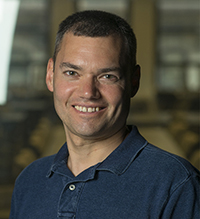
Peter Beinart
It’s time to abandon the notion of a two-state solution for Israel and Palestine and instead embrace the goal of Jewish-Palestinian equality, Peter Beinart said during a Peoria Area World Affairs Council talk via Zoom conferencing.
Beinart, editor-at-large for Jewish Currents and contributor to The Atlantic, presented a talk titled “How Can Israel and Palestine Move Forward?”
Don Sampson, a retired high school history teacher and former president of PAWAC, said it was one of the best programs PAWAC has ever hosted.
“The two-state solution is no longer viable, especially after Jared Kushner and his plan –– ‘take it or leave it,’” Sampson said, referring to President Trump’s son-in-law who devised a plan permanently giving all Israeli settlements in the West Bank to Israel. That comes after Trump announced he was moving the U.S. Embassy from Tel Aviv to Jerusalem. Both decisions essentially unilaterally take Palestinian land and give it to Israel.
With emotion and fear driving both sides into extreme positions, Sampson said moderate voices are crucially needed. He looks at Ireland and Northern Ireland as an example of consensus building in which both sides of a violent emotional conflict gain equal rights.
Sampson and Beinart see brutal repression of Palestinians ultimately, if unaltered, leading to an eruption of resistance.
“Whether it’s in 10 or 20 years this shakes out eventually Israel will pay a price. It’s a time bomb in motion,” Sampson said, acknowledging both sides of this issue are driven by fear, “but fear makes thinking irrational.”
Beinart said liberal Zionists believe the creation of a Jewish state must be the same as a liberal democracy, but in Isreal today, Palestinians are denied citizenship. They represent 20% of Israel’s population but have no rights as citizens. Additionally, 750,000 Palestinians were forced from their homes.
Gary Davis, retired college professor and administrator, agrees with Beinart’s support of one state with equal rights for all. Beinart’s support for this has made him the target of harsh criticism. He said Alan Dershowitz said support of one state with equal rights for all is the same as advocacy for “the final solution” that was the Nazi term for the genocide of all Jewish people.
Davis said people have to get away from the notion that all criticism of Israel is anti-Semitic. The criticism can, in fact, be motivated by helping Israel become stronger.
“I criticize my country all the time. It’s to make it stronger,” Davis said, referencing his criticism of Lyndon Johnson’s support of the Viet Nam War.
Boycotting Israel was not a position Davis embraced 10 years ago, but he does today. He was a university administrator when protesters called on schools to divest from all companies doing business in apartheid South Africa. He said it was an agonizing decision but it proved to be the correct decision.
“Now I support a boycott because it is the only thing to force Israel to change,” Davis said.
Israel is not a constitutional democracy like the United States. Creating a constitution in Israel that protects the basic rights of all people is criticized by some who fear sharing civil rights with Palestinians will dissipate Jewish power.
Davis disagrees, contending the move will enlarge the community and make it a stronger nation of equals.
He does not see much change with the United Arab Emirates recent move to normalize relations with Israel, noting that Benjamin Netanyahu’s concession to drop annexation of settlements could be temporary.
Davis said an old joke told by his father, a farmer in northeast Iowa, was about a farmer who only wanted the land next to his, but of course, then there was desire for the land next to that and the land next to that.
Angela Weck, executive director of PAWAC, questioned Beinart about why he was once in favor of a two-state solution but no longer is.
“The two state solution is dead,” he said, referencing the 1967 war when Israel conquered the West Bank. “An entire population lives under the control of others. It’s monstrous to see that. A state not accountable to the people it controls acts brutally toward those people, and Israel does.”
Under the current system, Palestinians lack basic rights, Beinart said. He urges looking to other deeply divided people for solutions, notably Yugoslavia, Northern Ireland and South Africa.
Beinart, a practicing and devout American Jew, said, “My challenge is to be a loving critic . . . . My solution is one state with equal rights.”
He cites the Civil Rights Movement in America, saying “We see the denial of rights of some is destabilizing and untenable. People who lack basic rights will rise up.”
Weck questioned how Beinart can factor into his vision the Palestinian call for the elimination of the Jewish state.
He said Palestinians are denied rights under the Jewish state and therefore don’t support it.
“Palestinians don’t accept the Jewish state,” he said, cautioning that is not the same as saying Palestinians don’t accept Judaism.
Beinart said he reads what Palestinians write on this topic, and they express visions of equality.
“Palestinian behavior is not perfect and some acts are immoral but Palestinians are not the same as Nazis,” he said, noting that on three separate occasions, Israel bombed Gaza to rubble.
“We must build alliances with all groups who are oppressed. Our safety is intertwined,” Beinart said.
The Zoom presentation “How Can Israel and Palestine Move Forward?” can be viewed on YouTube:
https://www.youtube.com/watch?v=SdIsGB6qUwQ&feature=youtu.be&fbclid=IwAR2w1ek7gqWB419gF61HgfEYn4d5Zainh-U9IHDggiz9wnRcY_Y-rMRzFQc
Beinart’s recent essay can be read here: https://jewishcurrents.org/yavne-a-jewish-case-for-equality-in-israel-palestine/

Recent Comments